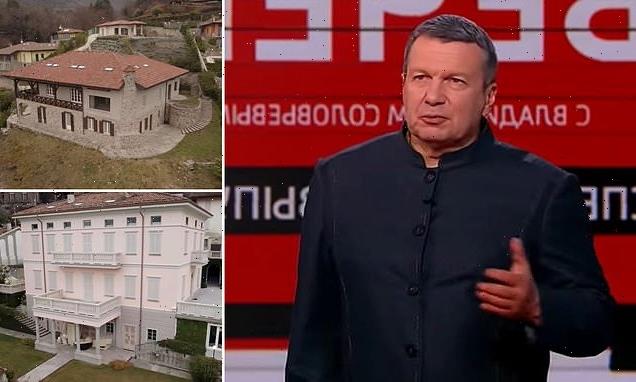Inflation and higher energy bills could lead to sharpest fall in UK living standards since 1956
Last modified on Sun 27 Feb 2022 11.01 EST
These are challenging times. The reconstruction job from Covid-19 had barely begun when Russia invaded Ukraine. Now the international consensus to build back better from the pandemic has been replaced by an urgent need to stop the conflict and prevent it escalating.
With such high stakes, economic sanctions not bombs are the western weapon of choice, limiting Vladimir Putin’s ability to muster guns and butter. But while there will be harsher consequences for Russia, made a pariah under the Putin regime, it is a battle not without economic collateral damage.
European leaders will this week announce a strategy to cut Europe’s reliance on Russian energy – a plan in the works before the first tank rolled into Ukraine, now given added urgency. With Russia accounting for 40% of EU gas imports – rising to 65% in Germany and 100% for some eastern European states – it is a prudent move. Yet it is a process likely to take years. In the meantime, the shock of war will drive up energy prices across the continent – adding to what was already the worst squeeze on living standards in decades.
In Britain the inflationary surge could lead to the sharpest annual fall in living standards since at least 1956, the year of the Suez crisis. Not even the oil price shocks of the 1970s or the 2008 financial crisis come close, witnessed as the fallout from Covid holds back recovery from the worst recession in a century.
The fact that such a squeeze will result is damning. Inflation is forecast to peak close to 8% this year, but that is still less than half the rate seen four decades earlier, when it hit almost 23% in 1975. Instead, today’s cost of living crisis is not only inflationary but also stems from weaker rates of wage growth, made worse by harsh benefit cuts hitting the poorest in society.
The big difference in the 1970s was worker power, with higher rates of trade union membership enabling employees to demand higher wage settlements to deal with rising costs. Despite the record postwar inflation rate, pay growth rocketed by 29% in 1975. It was two years later in 1977, when wage growth of 11% was outpaced by inflation of 15%, that set the previous record for the worst year for growth in living standards since Suez.
At the Bank of England the concern is that a rerun of the 1970s would lead to a wage-price spiral, when workers demanding higher pay leads to companies raising their prices to accommodate a higher wage bill, in an unsustainable game of leapfrog. Such a process would hurt those with the least bargaining power, and is a big fear today for the Bank’s governor, Andrew Bailey.
Back then, central banks ramped up interest rates to eye-watering levels to spike inflation, alongside western governments embracing neoliberalism and global trade and tackling worker power. Such an option would lack credibility today.
The inflation shock of the 2020s comes with trade union membership and headline rates of income and corporation tax half what they were in the 1970s. Globalisation has peaked, public utilities are in private hands, while support is limited for slashing employment rights and product standards.
Central banks are particularly hamstrung, as changes to interest rates take time to fully feed through to the economy. As Ben Broadbent, the Bank’s deputy governor, pointed out last week, getting ahead of our current energy-driven inflation shock would have required action in the summer of 2020.
Against this backdrop, it is unthinkable that the government’s recent package of energy support measures will prove the last word in insulating households from the worst cost of living crisis since the mid-1950s.
However, Westminster sources suggest Rishi Sunak is not preparing any tax and spending changes to announce at next month’s spring forecast statement. The chancellor is due only to deliver economic and fiscal forecasts from the Office for Budget Responsibility to meet legal requirements for a biannual update.
Sunak will probably give a narrative of recent progress and vision for the future; talking up the government’s management of the economy as prudent in challenging times, with a promise made for lower taxes in future. The news is expected to be positive, with the OBR likely to update its forecasts for 2021-22 to show public borrowing of about £20bn less than forecast in October.
However, the chancellor will face growing demands to loosen the purse strings in response to the conflict in Ukraine and its knock-on consequences for UK households and businesses. Calls will be made from left and right, with the national insurance hike planned for April and plans for fuel duty likely to animate his backbenchers.
There will be demands to bolster defence spending and calls to invest in diversifying the UK’s energy supplies. While rightwing Conservatives will push for an embrace of fracking and domestic oil and gas, the climate emergency means that turning away from the green transition must be avoided.
The biggest short-term demand, however, will be on insulating households from a further rise in their energy bills.
Poverty campaigners warn the benefits system is the best mechanism for helping those most in need. At present the government plans to uprate benefits by just 3.1% in April – less than half the forecast rate of inflation – in a real-terms cut for the poorest families in the country at a time when the UK’s main out-of-work support is already the least generous in 30 years following a decade of cuts.
The Joseph Rowntree Foundation estimates 400,000 people could be pulled into poverty by this real-terms cut. Still, rather than tackle this head on, the government last week bizarrely chose to make matters worse – announcing the end of pandemic support measures that will leave Britain with among the most miserly sick pay regimes in the western world.
With the dust still settling from Covid-19 and the government waging economic warfare against Russia, more needs to be done to prevent the worst hit to living standards for more than half a century.
Source: Read Full Article

